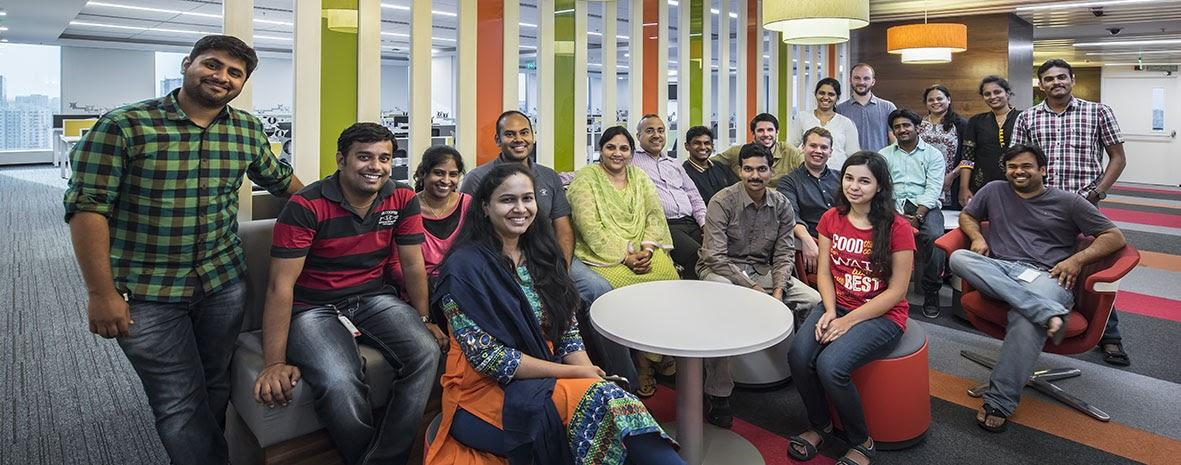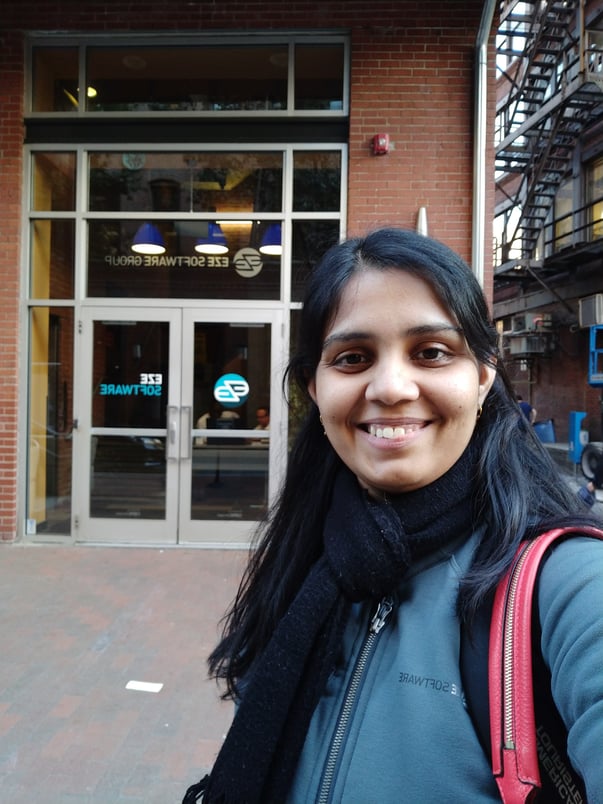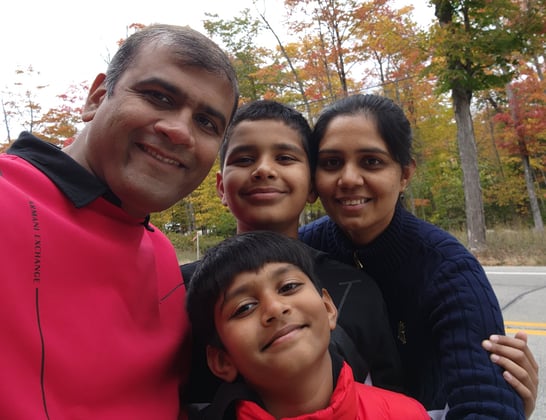As a director of product management, Swetha Arayasomayajula’s career has been guided by a quality many – wrongfully – overlook: the ability to ask good questions and listen to the answers.
Harvard Business Review (HBR) reports that questioning is a powerful way to unlock value in organizations. It can spur learning and the exchange of ideas, fuel innovation and performance improvement, and build rapport and trust among team members.
However, HBR also reports that executives often do not think of questioning as a skill that can be honed. While there are a variety of reasons for executives’ lack of questioning – ego, apathy, and fear – in most cases, leaders just don’t realize what a uniquely powerful tool it is for unlocking potential in organizations.
But there is distinct value in questioning; just ask Swetha.
In our latest leadership profile, we take a closer look at Swetha’s career. From her early days in QA to her current role leading development for the Eze OMS, we discover how curiosity and openness to learning shaped Swetha’s professional growth and has helped to fuel her success.

Developing a Curious Mind
Nearing graduation from Andhra University in India, Swetha initially didn’t see herself working in capital markets.
“I graduated from college with a degree in mechanical engineering, but after an on-campus interview, I landed my first job doing quality assurance for a capital markets firm," says Swetha.
 Swetha Arayasomayajula
Swetha Arayasomayajula
At first, Swetha wondered about her career choice. But three months into the job, a trip to Australia to work onsite for a client would change her perspective. In that time, Swetha met a mentor who would teach her not only about capital markets but how to approach her career – and life.
“When I told my mentor, a leader in the capital markets space, how frustrating it was not to be doing what I studied in university, he shared that he had studied horticulture,” remembers Swetha. “He said that just because your work is different from what you studied doesn’t make it less important. He taught me that by keeping an open mind and asking questions, I could navigate uncertainty and find opportunities on this new career path."
Her mentor provided Swetha with materials and information she could use to educate herself on the industry. The more she learned, the more curious she became, and fortunately, her mentor was there to guide her learning.
“Lessons from those early days still shape how I approach my day-to-day work and my career," says Swetha.
Onto the Next Opportunity: Developing the Eze OMS
After six years in Australia, Swetha moved back to India to start her family and be closer to her parents. “I wanted my kids to connect with their grandparents,” recalls Swetha.
As her children grew, Swetha started a new job that didn't provide the challenges she had hoped for. “I was bored and not learning anything," she comments.
Her decision to leave that role put her on a new path. In 2016, she joined the newly opened SS&C Eze office in Hyderabad.
“My fun fact is that I would have been the third or fourth employee at the Hyderabad office, but I got stuck in traffic and ended up as the eighth,” laughs Swetha.

Swetha with team members at the SS&C office in Hyderabad
The opportunities and challenges of this growing company appealed to the learner in Swetha; it was clear that she would never be bored.
“When I started with the Eze organization, I worked in product management for the Eze OMS,” remembers Swetha. “I oversaw the product transition process for the first five development teams.”
She goes on to say, “From the start, I loved the culture; the whole company was growing, and we were developing features that solved big challenges,” says Swetha. “The company was amazing then, and it continues to be a place of growth and opportunity.”
Real-World Learning from Asset Managers and Hedge Funds
In 2020, Swetha expanded her learning again, moving to the SS&C Eze office in London to manage product engagement.
Swetha says this time working with users provided valuable, real-world perspectives on how investment firms utilize Eze technology and what questions and concerns come up for them as they do.
When Swetha then moved to the United States to assume the role of associate director of product management, she could implement the lessons learned from her work with clients.
“Hearing feedback and questions directly from clients was invaluable and shapes my work in product management," says Swetha. “That experience taught me to never assume and to keep inquiring about how and why our products are used.”
The wisdom she has accumulated is especially important in times like this when markets – and the needs of clients – are shifting.
“The critical work of any product manager is to ensure that you have a constant communication channel and proper feedback loop with your users,” says Swetha. That feedback guides our development efforts, ensuring that we are addressing clients' future needs while also solving existing market requirements.
Building the Investment Technology of The Future
Today, as part of SS&C, Swetha finds herself in a familiar place: deep in discovery, exploring new possibilities.

Swetha at the old SS&C Eze office in Boston
Right now, she is working on ways to continue expanding and enhancing the front-to-back technology experience for wealth and investment managers through integrations between solutions across SS&C. Hear Swetha talk about these advancements in this video.
According to Swetha, “Learning new products and meeting new people means the knowledge is getting increased. And that is a huge value for everybody who cherishes growth.”
And clearly, Swetha does.
Women in Leadership: Asking for What You Deserve & Seeking Help
CIO magazine recently published research on the state of women in tech. They found that while 43 percent of entry-level software roles were held by women, only 52 women are promoted to manager for every 100 men. That disparity continues the further up women go on the career ladder, and at the senior level, women currently represent only 30 percent of roles.
A leadership course at Wharton Business School helped Swetha understand some factors that may contribute to this disparity.
The instructor shared a job description for a managing director role and the job's specific tasks and requirements. She then asked the class how many would apply.
“In a class of about 30 people, only 2 raised their hands,” says Swetha.
Swetha says that what she learned next really stuck with her. Of all those who applied for the managing director position, 75 percent were men, and only 25 percent were women. However, each woman who applied was currently meeting 100 percent of the requirements in the job description.
“It struck me that the instructor was right about women holding themselves back,” comments Swetha. “Women need to feel empowered to put themselves forward for senior leadership roles or new opportunities – even if they don’t have each and every qualification.”
She goes on to say that growth will come easier for women when they find mentors who can help establish goals and provide support to help them grow.
Swetha believes that asking for support is also critical in women’s personal lives, where women often assume responsibility for more than their fair share of the work.
 Swetha and her family in Washington Island, Wisconsin
Swetha and her family in Washington Island, Wisconsin
“Throughout my career, I have been asked how I manage my work and family," says Swetha. “The truth is, I am not always able to. I get tired, my house is a mess, and my work is pending. But having a support system at home is just as important as having one at work if you are to grow in your career." And, whether she is facing a challenge at work or at home, Swetha remembers this advice from her first mentor, “One of my favorite pieces of advice he gave me was, ‘When you go into anything, always prepare for the worst but try to give it your best; see what you can learn from it.'"
Swetha concludes, “I’ve always tried to live by that motto, and today, I can say that it has served me well.”

